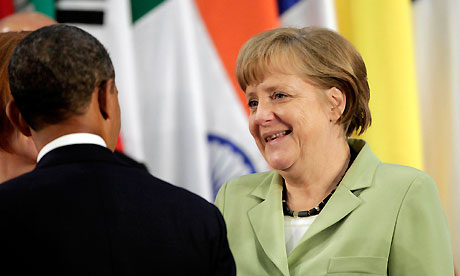Πηγή: Guardian
by Larry Elliott
If the stories coming out of Los Cabos are correct, the Germans have surrendered. Angela Merkel, it appears, has agreed that Europe's bailout fund should be used to buy up Spanish bonds. This is precisely the show of "shock and awe" that the markets have been demanding, and the immediate response will undoubtedly be positive. All the financial firepower that Europe can muster will be used in an attempt to drive down Spain's borrowing costs from the 7%-plus level they have reached this week.
That, at least, is the talk. It is worth noting from the outset that Europe has failed to deliver on its fine-sounding rhetoric in the past. The detail of this deal may prove less impressive than the behind-the-scenes briefing, in which case the market reaction will be swift and brutal.
But let's assume that this is for real. Why would Germany be prepared to play fast and loose with the tough conditions that Berlin itself insisted on when the European Financial Stability Facility and its successor were created.
The rules say that the bailout funds should not take on the risks associated with buying up the debt of a member country unless it is part of an official European Union-International Monetary Fund programme. Although details are sketchy, this appears to be the sort of no-strings attached deal that Merkel has always steadfastly opposed.
So why is this happening? Not because Germany has come under fire at the G20 summit, although it has. Not because Merkel has changed her mind about the potential costs of such an arrangement for her own taxpayers. Rather, it is because the events of the past few weeks have left Germany with a binary choice: support emergency action to prop up the eurozone's fourth biggest economy or watch monetary union slide into the abyss. Berlin does not want to be blamed for destroying theeuro "project", and recognises that a crisis involving Spain (with Italy waiting in the wings) is of a whole different order or magnitude to one affecting Greece, Portugal and Ireland.
What this means is that European policymakers have decided to take on the bond vigilantes. The hope is that they can drive 10-year Spanish bond yields out of the danger zone, take the pressure off the creaking Spanish banking system, and thus avoid the need for Madrid to seek formal help from the EU and the IMF.
This, for certain, is a high stakes game. Part of Europe's fighting fund has already been spent on bailing out Greece, Portugal and Ireland. Spain has also pledged funds to the EFSF and ESM, and these clearly cannot be spent buying up the country's own debt. The markets might decide that it is worth taking on Europe in the way that George Soros did in 1992, when he saw the pound as ripe for a killing.
That risk is exacerbated by the dire state of the Spanish economy, which is suffering from a long-lasting hangover after the bubble in its construction and property sectors in the years running up to 2007. With a tough austerity programme in place, the economy is still going backwards and house prices have further to fall. A lot further, in all probability. If the gamble fails, Spain will still need a bailout and Europe will have nothing left in the kitty for Italy. But in the circumstances, Merkel and her fellow eurozone leaders may think it is a gamble they have to take.

Δεν υπάρχουν σχόλια:
Δημοσίευση σχολίου